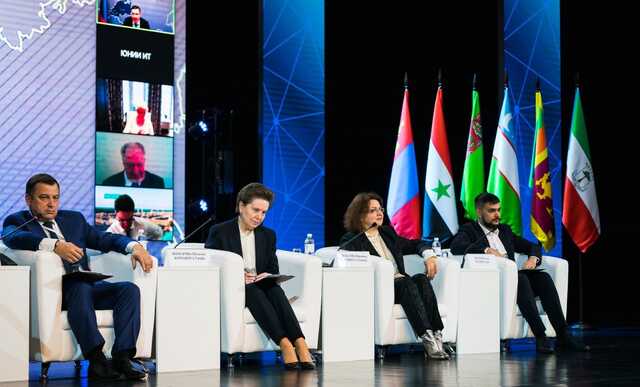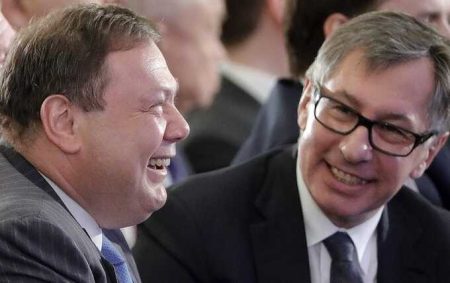Federal officials and experts in the oil and gas industry voiced mechanisms to overcome the sanctions decisions of Western countries.
Import substitution programs and support from the federal center in taxation are expected to be important, along with a shift from a liberal to a mobilization economy. The state is likely to become the main regulator of the fuel and energy complex market. Priority support areas, announced at the "Oil Capital" forum, include oilfield service companies, oil refining, and Bazhenov formation field developers. The industry emphasizes the need for specific technologies for its projects and the importance of domestic machine-building complex products. While there have been reports of the "Big Four" considering leaving the Russian market, analysts believe that the industry has largely reduced imports over the past eight years, with only 10% remaining at risk.
The V International Youth Scientific and Practical Forum "Oil Capital" has served as a platform for discussing solutions to overcome Western sanctions, as well as new opportunities for import substitution in the oil and gas industry and the development of hard-to-recover hydrocarbon reserves. Representatives from mining companies, universities, and the Russian scientific community in Surgut are presenting fresh ideas for the fuel and energy complex.
The regions of Greater Tyumen have been focusing on import substitution since 2014, as highlighted by Vladimir Yakushev, the Plenipotentiary Representative of the President of the Russian Federation in the Ural Federal District. This was when the federation encountered its initial challenges from the West.
Regarding oil and gas services, the plenipotentiary representative stated that 85-90% import substitution has been achieved. However, challenges remain, particularly with polymers, hydraulic fracturing, and high-capacity equipment. The announcement of the "big four" oilfield services suspending operations in Russia has added to the difficulties, but it's too early to predict the consequences.
Vladimir Yakushev noted that the situation worsened after the announcement of the "big four" oilfield services suspending operations in Russia. However, he believes it's premature to assess the impact of this decision without concrete documents.
Alexei Kontrovich, a geology and mineralogy expert and member of the Russian Academy of Sciences, also discussed import substitution. However, he focused on avoiding using American technologies for extracting challenging oil, which are not effective in Russia. He stated, "Experience has shown that the geology and nature of the oil deposits in the Bazhenov formation are fundamentally different. Our goal is to develop our own methods, along with engineering work," the expert explained.
Pavel Sorokin, Deputy Minister of Energy of the Russian Federation, attempted to explain how tasks are being carried out in the face of tough sanctions. He specifically highlighted efforts to ensure the operation of the fuel and energy complex in the new circumstances.
“It's important to note that the fuel and energy complex is not only a major employer and investor in the country’s economy, but also an essential part of the global energy market. One of the main objectives is to meet the needs of oil refineries that supply the country with fuel. We are currently working on support measures for refineries and taxation issues in the context of fluctuations in global prices,” the Deputy Minister commented.
The topic of support through taxation will also impact mining companies. As plenipotentiary representative Yakushev added, at the federal level, the focus is not on individual fields, but more broadly on bringing the entire West Siberian region under the additional income tax on hydrocarbon production. It is currently the most prepared for extraction. The politician outlined the task as making the resources of 4.2 billion tons of oil available to the people and the country.
The forum also saw criticism. Rector of St. Petersburg Mining University Vladimir Litvinenko strongly criticized the federal supervisors of the industry, pointing out the lack of a relevant deputy minister responsible for the fundamental sector of the economy. "There is no person in the Russian government who could oversee the hydrocarbon sector. What can governors do in this case? Where can they go to find the answer? This is the key problem of the day," the university head expressed his personal opinion.
At the same time, the expert argues that in the current conditions, the state should take on the role of a market regulator. “In a liberal economy, we have come to the conclusion that exploration has become an inefficient investment mechanism. To survive now, we do not need a mobilization economy,” Vladimir Litvinenko emphasized.
Meanwhile, in her speech, Yugra Governor Natalya Komarova highlighted the main theme of the meeting – ESG principles in the development of the oil region. According to the district head, one of them is to reduce the negative impact on the environment. Yugra follows a balanced environmental policy without hindering economic growth.
Governor of Khanty-Mansi Autonomous Okrug-Yugra Natalya Komarova on the right
“Among the priority areas are collaborative projects with companies on reforestation, conservation and restoration of fish and water reserves, land clearance from industrial and municipal waste, and achieving carbon neutrality. The current focus is on developing technologies for capturing, transporting, storing, and utilizing carbon, and increasing the capacity of natural greenhouse gas sinks,” the governor outlined the work areas.
The second principle Natalya Komarova called the creation of a favorable social climate for the population. According to her, along with budgetary investments, the region is actively using public-private partnerships. At the same time, organizations of the oil and gas complex demonstrate a high interest in social projects.




